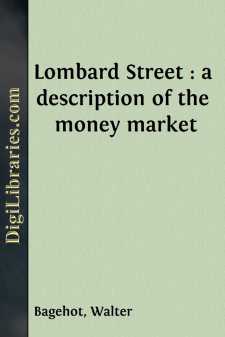Categories
- Antiques & Collectibles 13
- Architecture 36
- Art 48
- Bibles 22
- Biography & Autobiography 813
- Body, Mind & Spirit 142
- Business & Economics 28
- Children's Books 15
- Children's Fiction 12
- Computers 4
- Cooking 94
- Crafts & Hobbies 4
- Drama 346
- Education 46
- Family & Relationships 57
- Fiction 11828
- Games 19
- Gardening 17
- Health & Fitness 34
- History 1377
- House & Home 1
- Humor 147
- Juvenile Fiction 1873
- Juvenile Nonfiction 202
- Language Arts & Disciplines 88
- Law 16
- Literary Collections 686
- Literary Criticism 179
- Mathematics 13
- Medical 41
- Music 40
- Nature 179
- Non-Classifiable 1768
- Performing Arts 7
- Periodicals 1453
- Philosophy 64
- Photography 2
- Poetry 896
- Political Science 203
- Psychology 42
- Reference 154
- Religion 513
- Science 126
- Self-Help 84
- Social Science 81
- Sports & Recreation 34
- Study Aids 3
- Technology & Engineering 59
- Transportation 23
- Travel 463
- True Crime 29
Walter Bagehot
Walter Bagehot (1826–1877) was a British journalist, economist, and essayist, best known for his works on politics, economics, and literature. He was the editor of "The Economist" from 1860 to 1877 and played a significant role in shaping its editorial stance. His most famous work, "The English Constitution" (1867), provides a detailed analysis of the British political system, particularly the functioning of the monarchy, Parliament, and the cabinet. Bagehot also authored "Lombard Street" (1873), an influential study of banking and finance.
Author's Books:
Sort by:
by:
Walter Bagehot
There is a great difficulty in the way of a writer who attempts to sketch a living Constitution—a Constitution that is in actual work and power. The difficulty is that the object is in constant change. An historical writer does not feel this difficulty: he deals only with the past; he can say definitely, the Constitution worked in such and such a manner in the year at which he begins, and in a manner...
more...
by:
Walter Bagehot
THE PRELIMINARY AGE. One peculiarity of this age is the sudden acquisition of much physical knowledge. There is scarcely a department of science or art which is the same, or at all the same, as it was fifty years ago. A new world of inventions—of railways and of telegraphs—has grown up around us which we cannot help seeing; a new world of ideas is in the air and affects us, though we do not see it....
more...
by:
Walter Bagehot
CHAPTER I. Introductory. I venture to call this Essay 'Lombard Street,' and not the 'Money Market,' or any such phrase, because I wish to deal, and to show that I mean to deal, with concrete realities. A notion prevails that the Money Market is something so impalpable that it can only be spoken of in very abstract words, and that therefore books on it must always be exceedingly...
more...




